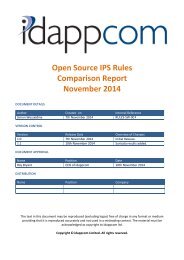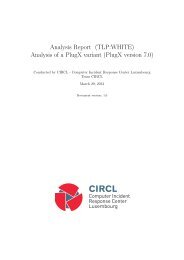The use of the Internet
The use of the Internet
The use of the Internet
You also want an ePaper? Increase the reach of your titles
YUMPU automatically turns print PDFs into web optimized ePapers that Google loves.
6<br />
THE USE OF THE INTERNET FOR TERRORIST PURPOSES<br />
(b) Incitement<br />
10. While propaganda per se is not generally prohibited, <strong>the</strong> <strong>use</strong> <strong>of</strong> propaganda by<br />
terrorists to incite acts <strong>of</strong> terrorism is considered unlawful by many Member States.<br />
<strong>The</strong> <strong>Internet</strong> provides an abundance <strong>of</strong> material and opportunities to download, edit<br />
and distribute content that may be considered unlawful glorification <strong>of</strong>, or provocation<br />
to, acts <strong>of</strong> terrorism. It should be noted, however, that some intergovernmental and<br />
human rights mechanisms have expressed doubt that <strong>the</strong> concept <strong>of</strong> “glorification” <strong>of</strong><br />
terrorism is sufficiently narrow and precise to serve as a basis for criminal sanctions<br />
compliant with <strong>the</strong> requirements <strong>of</strong> <strong>the</strong> principle <strong>of</strong> legality and <strong>the</strong> permissible limitations<br />
<strong>of</strong> <strong>the</strong> right to freedom <strong>of</strong> expression, as enshrined in articles 15 and 19 <strong>of</strong> <strong>the</strong><br />
International Covenant on Civil and Political Rights. 9,10<br />
11. It is important to emphasize <strong>the</strong> distinction between mere propaganda and material<br />
intended to incite acts <strong>of</strong> terrorism. In several Member States, in order to be held<br />
liable for incitement to terrorism, a showing <strong>of</strong> <strong>the</strong> requisite intent and a direct causal<br />
link between alleged propaganda and an actual plot or execution <strong>of</strong> a terrorist act is<br />
required. For example, in a contribution to <strong>the</strong> expert group meetings, a French expert<br />
indicated that <strong>the</strong> dissemination <strong>of</strong> instructive materials on explosives would not be<br />
considered a violation <strong>of</strong> French law unless <strong>the</strong> communication contained information<br />
specifying that <strong>the</strong> material was shared in fur<strong>the</strong>rance <strong>of</strong> a terrorist purpose.<br />
12. Preventing and deterring incitement to terrorism in <strong>the</strong> interest <strong>of</strong> protecting<br />
national security and public order are legitimate grounds for limiting freedom <strong>of</strong> expression,<br />
as provided under article 19, paragraph 3, <strong>of</strong> <strong>the</strong> International Covenant on Civil<br />
and Political Rights. <strong>The</strong>se grounds are also consistent with article 20, paragraph 2, <strong>of</strong><br />
that Covenant, which requires States to prohibit any advocacy <strong>of</strong> national, racial or<br />
religious hatred that constitutes incitement to discrimination, hostility or violence. In<br />
<strong>the</strong> light <strong>of</strong> <strong>the</strong> fundamental nature <strong>of</strong> <strong>the</strong> right to freedom <strong>of</strong> expression, however, any<br />
restrictions on <strong>the</strong> exercise <strong>of</strong> this right must be both necessary and proportional to<br />
<strong>the</strong> threat posed. <strong>The</strong> right to freedom <strong>of</strong> expression is also linked to o<strong>the</strong>r important<br />
rights, including <strong>the</strong> rights to freedom <strong>of</strong> thought, conscience and religion, belief and<br />
opinion. 11<br />
(c) Radicalization<br />
13. Recruitment, radicalization and incitement to terrorism may be viewed as points<br />
along a continuum. Radicalization refers primarily to <strong>the</strong> process <strong>of</strong> indoctrination that<br />
<strong>of</strong>ten accompanies <strong>the</strong> transformation <strong>of</strong> recruits into individuals determined to act<br />
with violence based on extremist ideologies. <strong>The</strong> process <strong>of</strong> radicalization <strong>of</strong>ten involves<br />
9 General Assembly resolution 2200 A (XXI), annex.<br />
10 See <strong>the</strong> following reports <strong>of</strong> <strong>the</strong> Special Rapporteur on <strong>the</strong> promotion and protection <strong>of</strong> human rights and fundamental<br />
freedoms while countering terrorism: A/65/258 (para. 46) and A/61/267 (para. 7); see also <strong>the</strong> report <strong>of</strong> <strong>the</strong><br />
Special Rapporteur on <strong>the</strong> promotion and protection <strong>of</strong> <strong>the</strong> rights to freedom <strong>of</strong> opinion and expression, addendum<br />
on <strong>the</strong> tenth anniversary joint declaration: ten key challenges to freedom <strong>of</strong> expression in <strong>the</strong> next decade (A/HRC/14/23/<br />
Add.2).<br />
11 Office <strong>of</strong> <strong>the</strong> United Nations High Commissioner for Human Rights, “Human rights, terrorism and counterterrorism”,<br />
Fact Sheet No. 32 (Geneva, 2008), Chap. III, sect. H.







